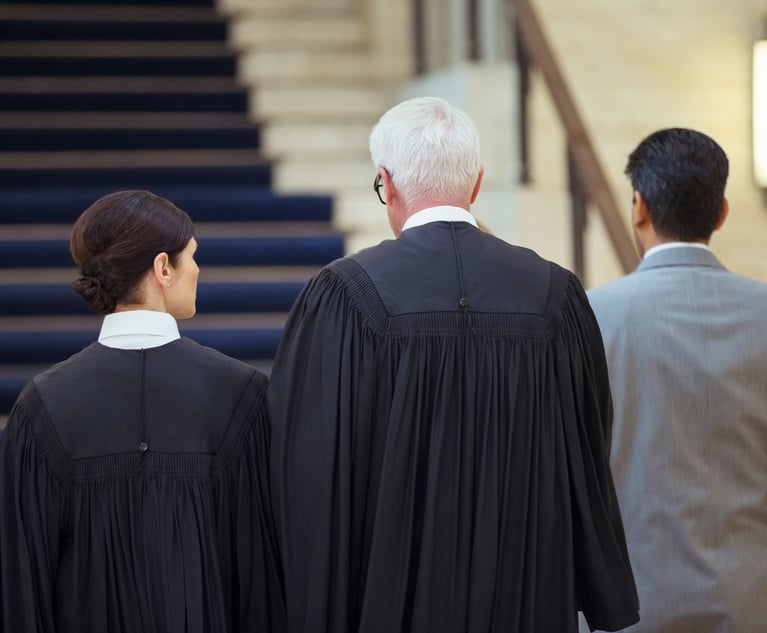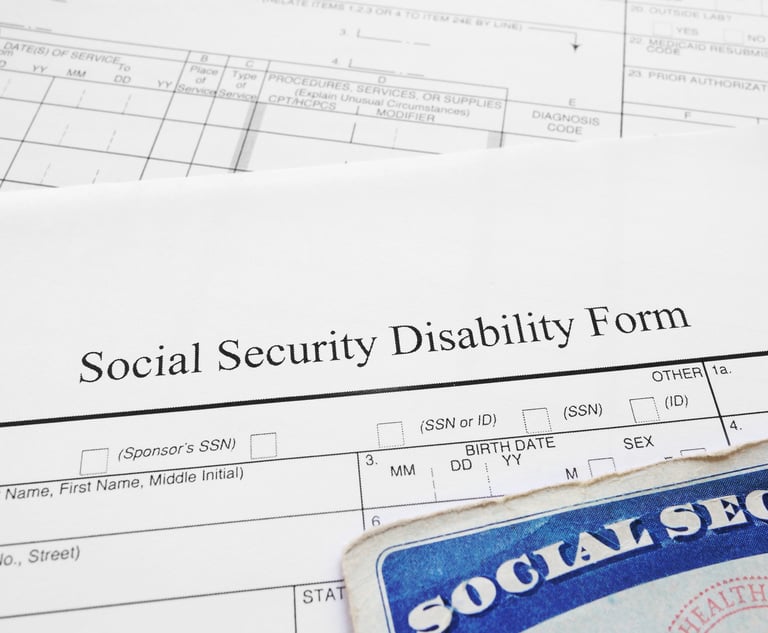Judicial Ethics Opinion 20-34/20-35
The judge need not disqualify him/herself from matters involving a filed disciplinary complaint against a judge, if the Commission on Judicial Conduct has not issued a formal written complaint.
July 31, 2020 at 09:57 AM
6 minute read
The Advisory Committee on Judicial Ethics responds to written inquiries from New York state's approximately 3,600 judges and justices, as well as hundreds of judicial hearing officers, support magistrates, court attorney-referees, and judicial candidates (both judges and non-judges seeking election to judicial office). The committee interprets the Rules Governing Judicial Conduct (22 NYCRR Part 100) and, to the extent applicable, the Code of Judicial Conduct. The committee consists of 27 current and retired judges, and is co-chaired by former associate justice George D. Marlow of the Appellate Division and the Honorable Margaret Walsh, a justice of the Supreme Court.
Digest: (1) Where a local attorney's paralegal filed a disciplinary complaint against a judge, but the Commission on Judicial Conduct has not issued a formal written complaint, the judge need not disqualify him/herself from matters involving the complainant or his/her employer, provided he/she can be fair and impartial. (2) If the Commission formally charges the judge with misconduct in a formal written complaint, the judge (a) must disqualify him/herself from matters in which the complainant appears; but (b) need not otherwise disqualify him/herself from matters involving the complainant's attorney employer, where the judge is satisfied the attorney did not participate in making the complaint and the paralegal's name does not appear on the papers and is unlikely to be present in the courtroom, provided the judge can be fair and impartial. (3) The judge need not disclose the disciplinary complaint, whether or not recusal is required.
Rules: Judiciary Law § 14; 22 NYCRR 100.2; 100.2(A); 100.3(E)(1); 100.3(E)(1)(a)-(f); Opinions 19-39; 16-129; 07-102; People v. Moreno, 70 NY2d 403 (1987).
Opinion: A local attorney's paralegal/secretary has filed a disciplinary complaint against the inquiring judge concerning allegedly improper campaign conduct. The allegations do not involve the attorney's cases or clients, and there is no indication the attorney had any involvement whatsoever in preparing or filing the complaint. As the paralegal does not appear in court nor does his/her name appear on court papers, the judge asks about the judges' obligations when the paralegal's attorney employer appears.
A judge must always avoid even the appearance of impropriety (see 22 NYCRR 100.2) and must always act to promote public confidence in the judiciary's integrity and impartiality (see 22 NYCRR 100.2[A]). Where, as here, disqualification is not mandated under a specific provision of the Rules Governing Judicial Conduct (see NYCRR 100.3[E][1][a]-[f]) or Judiciary Law § 14, the key question is whether the judge's impartiality might nonetheless "reasonably be questioned" (22 NYCRR 100.3[E][1]). If disqualification is not mandated by this objective test, the judge "is the sole arbiter of recusal" (People v. Moreno, 70 NY2d 403, 405 [1987]), and thus may preside, unless he/she doubts his/her own impartiality in the case.
1. Initial Stage: The Commission Has Not Filed a Formal Written Complaint
The judges first ask if they may continue to preside in matters involving the paralegal's attorney employer at this time, given that the Commission has not formally charged them with misconduct.
As noted in Opinion 16-129 (citations omitted), the mere filing of a complaint with the Commission
does not, by itself, require the judge's disqualification, provided the judge concludes in his/her sole discretion, that he/she can be fair and impartial. Any other rule would allow—and perhaps encourage—individuals involved in litigation to use the disciplinary system, or collateral actions against a judge, as a means to disrupt the court process or "judge shop."
Thus, these judges also need not disqualify themselves from matters involving the paralegal complainant or his/her attorney employer at this time.
2. Subsequent Stage: The Commission Files a Formal Written Complaint
The judges also ask if they may preside in matters involving the complainant's attorney employer, if and when the Commission charges them with misconduct in a formal written complaint.
As stated in Opinion 16-129 (citations, brackets, and footnotes omitted):
A formal written complaint reflects the Commission's "determination that a hearing is warranted," evidencing a degree of seriousness beyond mere judge-shopping concerns. Thus, if a judge believes he/she can be fair and impartial, the trigger for disqualification is the Commission's issuance of a formal written complaint, i.e. "a writing, signed and verified by the administrator of the commission, containing allegations of judicial misconduct against a judge for determination at a hearing." In other words, once the Commission issues a formal written complaint against a judge based on a litigant's, attorney's or witness's complaint, the judge must disqualify himself/herself involving that complainant.
Accordingly, if the Commission issues a formal written complaint based on the paralegal's allegations, the judges must disqualify themselves in all matters involving the complainant. This may happen, for example, if the paralegal appears as a litigant or is called as a witness in a case.
We reach a different conclusion with respect to the paralegal's attorney employer. The attorney is not the complainant, and nothing in the inquiry suggests he/she had any involvement whatsoever in preparing or filing the disciplinary complaint. Particularly where, as here, the alleged misconduct relates to a judicial campaign, rather than the attorney's practice, we see no reason to impute the paralegal's conduct to the attorney.
Accordingly, even if the Commission files a formal written complaint, as long as the judges are satisfied the paralegal acted independently of his/her attorney employer, we believe their impartiality cannot "reasonably be questioned" in matters involving the attorney (22 NYCRR 100.3[E][1]). Thus, each judge may preside in matters involving the attorney, if the judge decides he/she can be fair and impartial. This decision is confined to the judge's sole discretion (cf. People v. Moreno, 70 NY2d 403, 405 [1987]).
3. Disclosure
Finally, whether recusal is required, the judges ask if they must disclose the paralegal's complaint when the attorney employer appears.
Recusal. A judge who disqualifies him/herself, without offering an opportunity for remittal, is not ethically required to explain the reason or basis for doing so (see Opinion 07-102; accord e.g. Opinion 19-39). Here, too, if a judge exercises recusal in a particular case — whether because (a) the complainant appears after the Commission issued a formal written complaint or (b) the judge doubts his/her ability to be fair and impartial — he/she need not disclose the basis for recusal. In either instance, he/she may simply recuse without disclosing the disciplinary complaint.
Non-Recusal. On these facts, as noted above, the judges' impartiality cannot reasonably be questioned in matters involving the paralegal's attorney employer, based solely on the paralegal's disciplinary complaint. Accordingly, disclosure is not ethically required when the attorney appears.
This content has been archived. It is available through our partners, LexisNexis® and Bloomberg Law.
To view this content, please continue to their sites.
Not a Lexis Subscriber?
Subscribe Now
Not a Bloomberg Law Subscriber?
Subscribe Now
NOT FOR REPRINT
© 2024 ALM Global, LLC, All Rights Reserved. Request academic re-use from www.copyright.com. All other uses, submit a request to [email protected]. For more information visit Asset & Logo Licensing.
You Might Like
View AllTrending Stories
- 1Call for Nominations: Elite Trial Lawyers 2025
- 2Senate Judiciary Dems Release Report on Supreme Court Ethics
- 3Senate Confirms Last 2 of Biden's California Judicial Nominees
- 4Morrison & Foerster Doles Out Year-End and Special Bonuses, Raises Base Compensation for Associates
- 5Tom Girardi to Surrender to Federal Authorities on Jan. 7
Who Got The Work
Michael G. Bongiorno, Andrew Scott Dulberg and Elizabeth E. Driscoll from Wilmer Cutler Pickering Hale and Dorr have stepped in to represent Symbotic Inc., an A.I.-enabled technology platform that focuses on increasing supply chain efficiency, and other defendants in a pending shareholder derivative lawsuit. The case, filed Oct. 2 in Massachusetts District Court by the Brown Law Firm on behalf of Stephen Austen, accuses certain officers and directors of misleading investors in regard to Symbotic's potential for margin growth by failing to disclose that the company was not equipped to timely deploy its systems or manage expenses through project delays. The case, assigned to U.S. District Judge Nathaniel M. Gorton, is 1:24-cv-12522, Austen v. Cohen et al.
Who Got The Work
Edmund Polubinski and Marie Killmond of Davis Polk & Wardwell have entered appearances for data platform software development company MongoDB and other defendants in a pending shareholder derivative lawsuit. The action, filed Oct. 7 in New York Southern District Court by the Brown Law Firm, accuses the company's directors and/or officers of falsely expressing confidence in the company’s restructuring of its sales incentive plan and downplaying the severity of decreases in its upfront commitments. The case is 1:24-cv-07594, Roy v. Ittycheria et al.
Who Got The Work
Amy O. Bruchs and Kurt F. Ellison of Michael Best & Friedrich have entered appearances for Epic Systems Corp. in a pending employment discrimination lawsuit. The suit was filed Sept. 7 in Wisconsin Western District Court by Levine Eisberner LLC and Siri & Glimstad on behalf of a project manager who claims that he was wrongfully terminated after applying for a religious exemption to the defendant's COVID-19 vaccine mandate. The case, assigned to U.S. Magistrate Judge Anita Marie Boor, is 3:24-cv-00630, Secker, Nathan v. Epic Systems Corporation.
Who Got The Work
David X. Sullivan, Thomas J. Finn and Gregory A. Hall from McCarter & English have entered appearances for Sunrun Installation Services in a pending civil rights lawsuit. The complaint was filed Sept. 4 in Connecticut District Court by attorney Robert M. Berke on behalf of former employee George Edward Steins, who was arrested and charged with employing an unregistered home improvement salesperson. The complaint alleges that had Sunrun informed the Connecticut Department of Consumer Protection that the plaintiff's employment had ended in 2017 and that he no longer held Sunrun's home improvement contractor license, he would not have been hit with charges, which were dismissed in May 2024. The case, assigned to U.S. District Judge Jeffrey A. Meyer, is 3:24-cv-01423, Steins v. Sunrun, Inc. et al.
Who Got The Work
Greenberg Traurig shareholder Joshua L. Raskin has entered an appearance for boohoo.com UK Ltd. in a pending patent infringement lawsuit. The suit, filed Sept. 3 in Texas Eastern District Court by Rozier Hardt McDonough on behalf of Alto Dynamics, asserts five patents related to an online shopping platform. The case, assigned to U.S. District Judge Rodney Gilstrap, is 2:24-cv-00719, Alto Dynamics, LLC v. boohoo.com UK Limited.
Featured Firms
Law Offices of Gary Martin Hays & Associates, P.C.
(470) 294-1674
Law Offices of Mark E. Salomone
(857) 444-6468
Smith & Hassler
(713) 739-1250










